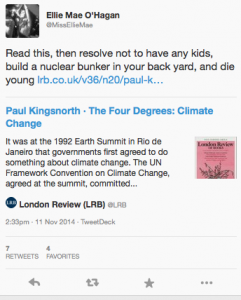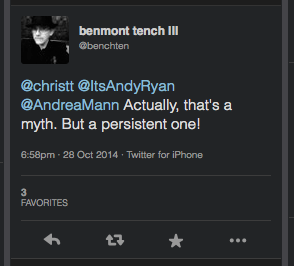
I went to the woods because I wished to live deliberately, to front only the essential facts of life, and see if I could not learn what it had to teach, and not, when I came to die, discover that I had not lived.
Henry David Thoreau, from Walden
In response to a characteristically brilliant and challenging piece by Paul Kingsnorth in the London Review of Books, Labour-left blogger and tweeter Ellie Mae O’Hagan (@misselliemae) published this pithy, sarcastic tweet:

It wasn’t the debate (such as it was) between these two that piqued my interest. It was O’Hagan’s inclusion of the example of not having children, with her other “comedy extreme” examples of building a nuclear bunker and dying young.
O’Hagan’s no Blairite centrist, not pro the current corporate hegemony. She’s to the left of Labour, a fierce, admirable activist and writer. So it’s fascinating to me that even someone like her can equate (mockingly) a decision not to have children (clearly meant to be read as ridiculous) with a nuclear bunker hidey-hole and an early death.
I (we) don’t have children, at least partly for ecological reasons. That decision is something I reflect upon a lot. I know I’ll feel sad about it in the future, yet news about the state of the world often makes me feel powerfully relieved that I’m not contributing in that way to the overall consumptive mess.
But it’s idiocy to present that as a reneging of some kind of responsibility, or an extremist’s reaction, as so often happens like this in mainstream cultural communication. It’s fascinating that within my life (particularly as we age, along with our social circle) it becomes a question I’m expected to answer – why haven’t we? – as opposed to the greater question that could travel in the other direction – why did you? – yet rarely does, still bearing a ridiculous sense of being socially unacceptable. I’ve even found myself pretending to acknowledge it’s my “selfish” decision not to breed, to make the answer feel easier for people who ask. While deep down thinking the very opposite. It’s taboo.
So, er, why did you?
What, don’t you bloody LIKE my kids!? They’re ACE!
What are the remaining selfless, outward looking reasons for having children in today’s world? Especially when children out there need adopting? Or do parents generally acknowledge it to be a fundamentally inward-looking, desire-based decision? Without meaning any disrespect, in my heart I know it as an inherently self-serving act (albeit co-ordinated with powerful biological imperatives).
Everyone’s presumption is that their own child will offer something unique, maybe even something so outstanding it singlehandedly counter-acts the global problems, because of that perfect nature of individuality where that is possible. How dare you question us: in 25 years my little Timmy will end the world’s food shortage! Despite huge numbers of wonderful offerings from smart humans; after all this time, we still head gradually for disaster while most people live in horrific, exhausted, soul-demolishing circumstances that they fight, day after day, to make the meagre best of, while those of us who have basic comfort don’t give a shit. If technology will save us all (rather than just saving the super-rich in the secret mountain) can it bloody hurry up please?
Your children aren’t special.
Bill Hicks
Undeniably there are too many humans on planet Earth. Unquestionably the world (as it is now) is being slowly devastated, not just by the greed and expansionism of a callow few (although there is that) but by the vast majority of normal, decent people around the world, trying to make their way within systems and infrastructures that were built in earlier periods of history, when we had space to go forth and multiply. That’s you and me – and our kids.
This reaches towards the core problem with mainstream environmentalism. The only viable solutions have a big effect on our comfort levels. The only viable solutions fundamentally alter our deeply embedded social and cultural ambitions for ourselves. In many ways, the only viable solutions require us to completely rebuild our sense of ourselves from the ground up. That’s how big the ask is. The scratching-at-the-edges solutions that we do engage with en masse (recycling, changing lightbulbs, a bit of middle-class composting, ooh I bought a fixed gear bike!) have negligible effect without an entirely different paradigm of global political and corporate willpower.
And we know this. And the Green Party can’t even get in the TV election debates.
Three things to save the planet: ditch cars, ditch the global meat trade and stop having kids. Me, out on the extreme? A skeptical reader reacting negatively to this blog entry is actually far more of a climate fatalist than I am: at least I chose a path to shift the riverflow of the rest of my days, for reasons of climate.
No, they’re the ones building a nuclear bunker, perpetuating what they think they need, for lack of the courage to step outside.
We are screwed.
Oh, by the way, look over there: some new episodes of High Maintenance on Vimeo.
One of my very favourite films of 2013 (and I think my favourite ever short) is a three-minute work by Hartlepool artist Maxy Bianco, called Pig The Dog. I saw it screened with 15 others on a loop at the Baltic Gallery, as part of the Random Acts exhibition, supported by Channel 4.
Doing my ‘end of year chart’ I placed this short film second, with only Clio Barnard’s masterpiece The Selfish Giant above it – so it obviously made a huge, lasting impact. It’s about an unusual life spent on the semi-rural scrubland at the edge of a northern city.
For the first half of 2014, I regularly looked for it online and failed to find it. Then yesterday at TEDxBrighton, one of the speakers vividly reminded me to seek out Pig The Dog – and this time I’ve struck gold; it’s gone up on the filmmaker’s Vimeo site.
So here it is, if you have three minutes to spare. Even if you only bother with one thing I’ve banged on about in recent months, please make it this one. There’s some swearing but you can live with that.
Pig the Dog from Maxy Neil Bianco on Vimeo.
By the way, here’s my live-blogging account of the TEDxBrighton talk that inspired me to go back and look for Pig The Dog again, though better watch the film first, before reading anything I’ve said about the talk.
For years, one of my favourite songwriting anecdotes has been this story, about Fergal Sharkey’s two big 1980s hits. It goes like this: Sharkey’s massive solo smash ‘A Good Heart’ was written by Maria McKee (legendary Lone Justice singer and solo star) about Benmont Tench (equally legendary genius keys man in Tom Petty’s Heartbreakers). Then Sharkey’s follow-up hit, ‘You Little Thief’ was written by Tench in response to McKee, so Sharkey turned into smash hits these two songs that are actually a conversation.
I love that anecdote, I re-tell it whenever any of those people gets even the briefest mention. There’s magic in two passionate, both lyrically superbly crafted songs, attacking the depth and detail of a clearly doomed love affair from different angles, then the material getting discovered and ‘curated’ into the pair they’re meant to be, by an entirely different artist.
Sometimes I add Deacon Blue into the mix, who wrote ‘Real Gone Kid’ about McKee, making her the muse of two very different classic 1980s hits.
Anyway, sadly the other night I discovered it’s a myth. I retold it to a friend on Twitter when she mentioned ‘A Good Heart’ and – yes you know where this is going, only in social media – Mr Tench himself popped into the conversation to debunk the myth. He did write ‘You Little Thief’, it’s just (he’s saying) it’s not about Maria McKee. He didn’t explain whether McKee’s ‘A Good Heart’ is about him – but then he’s probably the wrong person to ask about that.
 Twitter, eh. It was well gutting that the story isn’t true. At the same time it was well ace to get it from the horse’s mouth, especially from a guy who has informed my whole life as a keyboard player, on a par with Bittan and Federici. I didn’t make it up, by the way, it’s the ‘established version’. I was tempted to reply “but it’s on Wikipedia, it’s MUST be true,” to the actual person who’d know.
Twitter, eh. It was well gutting that the story isn’t true. At the same time it was well ace to get it from the horse’s mouth, especially from a guy who has informed my whole life as a keyboard player, on a par with Bittan and Federici. I didn’t make it up, by the way, it’s the ‘established version’. I was tempted to reply “but it’s on Wikipedia, it’s MUST be true,” to the actual person who’d know.
Anyway, that only leaves Evan Dando’s ‘It’s About Time’ versus Julianna Hatfield’s ‘For The Birds’, where he’s trying to persuade her to have sex with him. I hope that pairing doesn’t get debunked but if it does, I hope it’s Julianna who tweets in.





